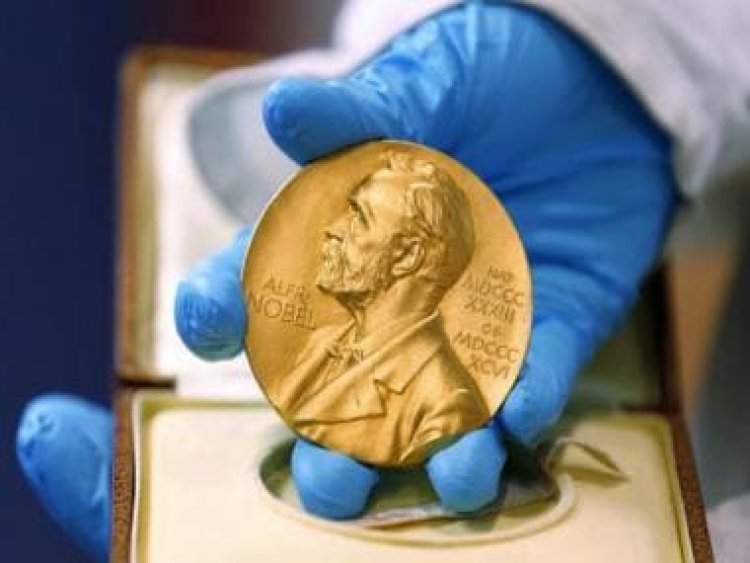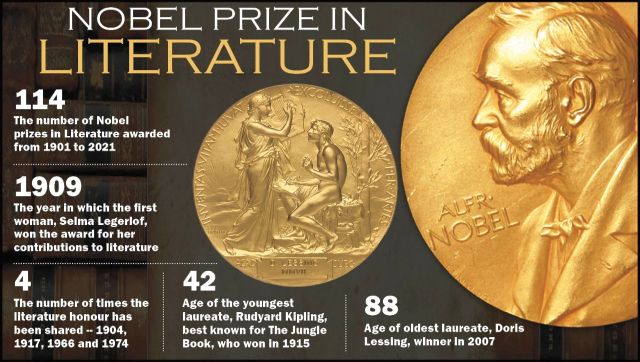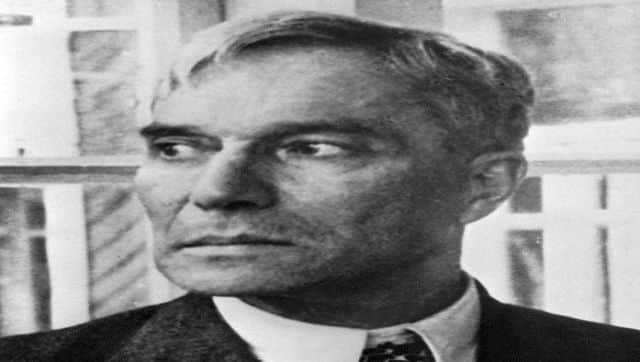A genocide denier, a #MeToo scandal and more: The controversies that have marred the Nobel Prize for Literature
A genocide denier, a #MeToo scandal and more: The controversies that have marred the Nobel Prize for Literature

Actor Will Smith slapping Chris Rock at the Oscars this year may go down as one of the most controversial moments at an award show. However, the Nobel Literature prize, which will be announced today, has been no stranger to controversy.
The prize, which began in 1901, that is meant to honour the best in the world of the written word has often caused a stir — from choices by the 18-member panel, to a MeToo allegation, to winners who have snubbed the award altogether.
The jurors of the Nobel Literature prize, who call themselves The Eighteen, have also been accused of Eurocentrism and gender biases. Critics of the literature award, in particular, argue it is highly subjective.
Also read: Not so Noble: How the Nobel Prize has become the most controversial award ever
Here’s a deep dive into the many controversies surrounding the Nobel Literature prize.
When winners snubbed the honour
One would think that being given an award is a big deal and people would like to accept it. However, the Nobel Literature prize may be one of the few awards that has been snubbed by its recipients.
In October 1964, French philosopher Jean-Paul Sartre, whose political philosophy was partly based on the criticism of institutions, became the first ever to decline the award.
Jean Paul Sartre was the first person to decline the Nobel Prize.
In 1964, Sartre was awarded the Nobel Prize in Literature, but made it known that he did not wish to accept the prize as he had always declined official honours.
More on Sartre’s refusal: https://t.co/rgEDGrc4Cp pic.twitter.com/dJzNph7yht
— The Nobel Prize (@NobelPrize) October 22, 2020
When a young AFP journalist, Francois de Closets informed him of his win, he said he had no intention of accepting the honour.
“I refuse the prize, that’s a fact, but I must reserve my explanations for the Swedish press,” the existentialist thinker said.
In a letter to the Swedish Academy, the author of Huis Clos and La Nausée explained that “a writer who adopts political, social, or literary positions must act only with the means that are his own – that is, the written word”, and that “all the honours he may receive expose his readers to a pressure I do not consider desirable”.
In a statement translated into English in the New York Review of Books, Sartre said he had “always declined official honours”, including France’s Legion of Honour.
“The writer who accepts an honour of this kind involves as well as himself the association or institution which has honoured him,” he said at the time. “The writer must therefore refuse to let himself be transformed into an institution, even if this occurs under the most honourable circumstances, as in the present case.”
Another case of a famous ‘snub’ was in 2016 when the Swedish Academy decided in a very controversial decision to award noted singer, lyricist Bob Dylan the literature honour.

Many were irked that The Eighteen had bestowed the honour to Dylan, arguing that lyrics to a song was not prose. “I’m a Dylan fan, but this is an ill-conceived nostalgia award wrenched from the rancid prostates of senile, gibbering hippies,” Scottish novelist Irvine Welsh had said as per a report in Euronews.
While the decision itself created many a hullabaloo, the singer’s silence on the honour caused even more furore.
For the longest time after being announced as the winner of the Nobel, Dylan chose to keep quiet on the matter, which was termed as being arrogant by some. The permanent secretary of the academy, Sara Danius, had told the press that it took two weeks for the singer and songwriter to accept their call.
Dylan also told the Academy that he was unable to receive the prize personally, an “unusual” decision for a Nobel laureate not to come to Stockholm to accept the award in person.
It was only in March 2017 that Dylan finally accepted the honour, putting to bed an almost five-month-long ordeal.
A controversial laureate
Sometimes, the choices made by the Swedish academy have come under fire for the author’s political belief.
No choice created as much furore as when Austrian writer Peter Handke was picked as the 2019 winner.
Handke, 76, was recognised for “an influential work that with linguistic ingenuity has explored the periphery and the specificity of human experience”.
However, thousands and thousands protested this move, making the award even more controversial than before.

The author is a known denier of the Bosnian genocide during the war in the Balkans in the 1990s and also a close supporter of former Serbia’s president Slobodan Milošević. In fact, Handke claimed that that Milošević had been wrongly misrepresented by Western media and that the massacres of Bosnian Muslim men and boys by Serbian troops were staged by Muslims themselves.
Such was the furore that free speech organisation PEN America issued a statement formally condemning the Nobel Committee’s decision. “We reject the decision that a writer who has persistently called into question thoroughly documented war crimes deserves to be celebrated for his ‘linguistic ingenuity.’ At a moment of rising nationalism, autocratic leadership, and widespread disinformation around the world, the literary community deserves better than this. We deeply regret the Nobel Committee on Literature’s choice,” said PEN America president and Pulitzer Prize winner Jennifer Egan.

A #MeToo scandal
The Nobel Literature award has not caused controversies only over its choices. In 2017, the reputation of the Swedish Academy was left in tatters after it emerged that the husband of one of the academy members had been accused of serial sexual abuse, in assaults alleged to have taken place over more than 20 years.
The row emerged when Swedish newspaper Dagens Nyheter published the testimonies of 18 women claiming to have been raped, sexually assaulted or harassed by Jean-Claude Arnault, the French husband of Academy member and poet Katarina Frostenson.
In addition to assault accusations against him, the pair were also accused of misusing academy funding.
The revelations sowed discord among the Academy’s 18 members, with six of resigning, including permanent secretary Sara Danius.
The scandal paralysed the Academy and it announced that it would defer the 2018 Nobel Literature prize by one year, a first in 70 years.
Choosing obscure writers
The Eighteen have been questioned many times over their pick of writers to win the honour. They have often chosen lesser-known names, owing to which some obvious candidates have fallen through the cracks.
The Academy has been criticised for rewarding obscure writers who are not widely read outside their own countries: Iceland’s Halldor Laxness (1955), Erik Axel Karlfeldt (1931), Odysseus Elytis (1979) and Jaroslav Seifert (1984).
In their attempt to be more inclusive, many prestigious names in literature have not been recognised with a Nobel such as Joseph Conrad, James Joyce, Marcel Proust, Paul Valery, Henry James and Virginia Woolf.
Another name that stands out is master of Russian literature, Leo Tolstoy. Rumours have it that the Swedish Academy never awarded Tolstoy because of the difficult and hostile history between Sweden and Russia. What’s certain is that Tolstoy died in 1910 without ever receiving this highly prestigious recognition.
Political meddling
Russian novelist and author of Doctor Zhivago Boris Pasternak was awarded the Nobel in 1958 but he was forced by the Soviet government to turn it down. Doctor Zhivago, which covers the period between the 1905 Russian Revolution and World War 2, was not allowed to be published in the Soviet Union and was eventually smuggled out.
Pasternak’s descendants re-accepted his award in 1988.

Similarly, the 1970 Nobel Prize for Literature was given to Soviet dissident Aleksandr Solzhenitsyn “for the ethical force with which he has pursued the indispensable traditions of Russian literature” during the Cold War.
Solzhenitsyn did not receive the award that year because he was afraid he wouldn’t be allowed to enter Soviet Union. The outspoken critic who was accused of anti-Soviet propaganda was expelled from the country in 1974, allowing him to accept the award.
With inputs from agencies
Read all the Latest News, Trending News, Cricket News, Bollywood News,
India News and Entertainment News here. Follow us on Facebook, Twitter and Instagram.
What's Your Reaction?



























































